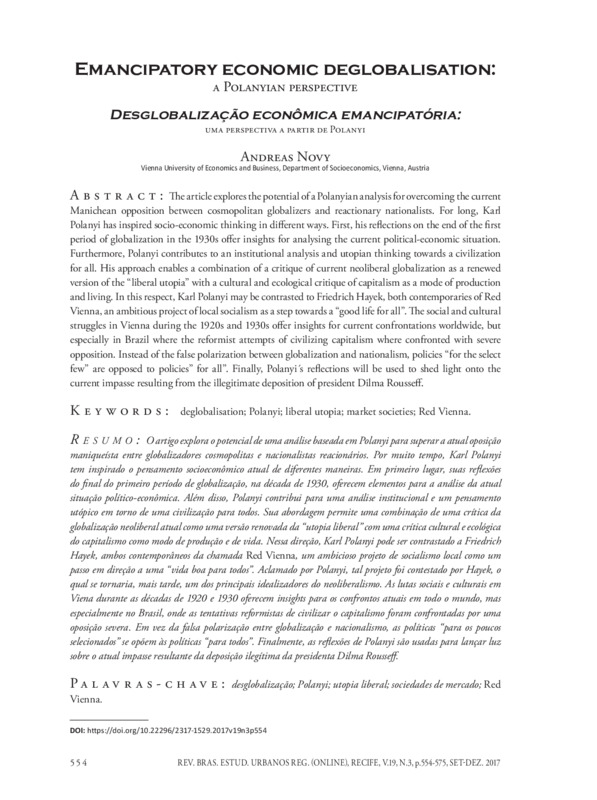Emancipatory economic deglobalisation: a Polanyian perspective | Desglobalização econômica emancipatória: uma perspectiva a partir de Polanyi
Item
-
Título
-
Emancipatory economic deglobalisation: a Polanyian perspective | Desglobalização econômica emancipatória: uma perspectiva a partir de Polanyi
-
Revista Brasileira de Estudos Urbanos e Regionais
-
WU
-
Autor
-
Andreas Novy
-
Assunto
-
globalização
-
liberalismo
-
mercado
-
Abstract
-
The article explores the potential of a Polanyian analysis for overcoming the current Manichean opposition between cosmopolitan globalizers and reactionary nationalists. For long, Karl Polanyi has inspired socio-economic thinking in different ways. First, his reflections on the end of the first period of globalization in the 1930s offer insights for analysing the current political-economic situation. Furthermore, Polanyi contributes to an institutional analysis and utopian thinking towards a civilization for all. His approach enables a combination of a critique of current neoliberal globalization as a renewed version of the "liberal utopia" with a cultural and ecological critique of capitalism as a mode of production and living. In this respect, Karl Polanyi may be contrasted to Friedrich Hayek, both contemporaries of Red Vienna, an ambitious project of local socialism as a step towards a "good life for all". The social and cultural struggles in Vienna during the 1920s and 1930s offer insights for current confrontations worldwide, but especially in Brazil where the reformist attempts of civilizing capitalism where confronted with severe opposition. Instead of the false polarization between globalization and nationalism, policies “for the select few” are opposed to policies” for all”. Finally, Polanyi´s reflections will be used to shed light onto the current impasse resulting from the illegitimate deposition of president Dilma Rousseff.
-
volume
-
19
-
issue
-
3
-
Páginas
-
554
-
Date
-
2017
-
título curto
-
RBEUR
-
Emancipatory economic deglobalisation
-
Língua
-
en
-
doi
-
10.22296/2317-1529.2017v19n3p554
-
issn
-
2317-1529
-
Rights
-
Direitos autorais 2017 Revista Brasileira de Estudos Urbanos e Regionais


